Tag Archive: beginning communicator
January 21, 2015
by Carole Zangari -
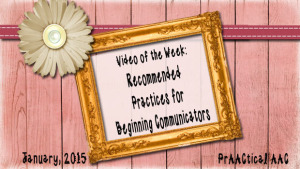
We return to the Institute on Disability at the University of New Hampshire to learn about ways to support beginning communicators. In this video, Dr. Rae Sonnenmeier discusses ways to create communication opportunities, research evidence for key intervention practices, and strategies that communication facilitators can use to support AAC learners at home, in school, and in the community.
Filed under: Video of the Week
Tagged With: beginning communicator, emerging communicator, Rae Sonnenmeier
October 5, 2014
by Carole Zangari -
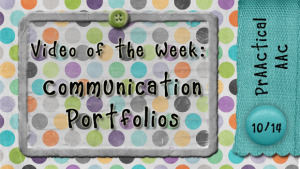
Helping teams to get to know the communication abilities of our AAC clients is something many of us struggle with. In this video from The Perkins School, we learn about their process for developing communication portfolios. http://www.perkins.org/resources/webcasts/communications-portfolio.html
Filed under: PrAACtical Thinking
Tagged With: assessment, beginning communicator, Perkins, portfolio, teaming, teams
September 23, 2014
by Carole Zangari -
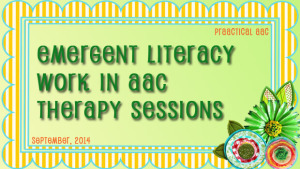
We strive to use some of our therapy time to build the literacy skills with all of our beginning communicators. It’s not easy. First, because they often have little to no interest in it (at first), but mostly because our time together is quite limited. Here are some of the things we’ve been doing. Having our clients sign in themselves (Think: name stamps, stickers, tracing, or even making a mark) Looking for their name on their therapy room door: We make signs and print two copies. We give them one in the waiting room so that they can match it to the sample on the door. Formatting the visual schedule so that the client does some writing (Think: check box, crossing off the activity when finished) Picking a book or the topic: For some of clients we use the books themselves, but for most we use their AAC. It’s time... [Read More...]
Filed under: PrAACtical Thinking
Tagged With: beginning communicator, Books, emergent literacy, writing
September 10, 2014
by Carole Zangari -
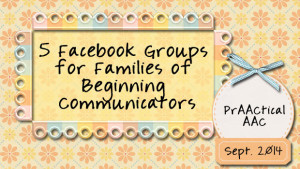
What’s better than parents and professionals who are knowledgeable about beginning to use AAC with children? Connecting with them on Facebook. Here are some of the most active AAC-related groups out there. 1. Speak for Yourself Users Group (Despite it’s name, this one is not limited to families/professionals who use SFY.) 2. AAC: Alternative Awesome Communicators 3. Angelman, Literacy, and Education (Despite the name, the content is very applicable to a broad range of developmental disabilities.) 4. Apraxia-Kids (not AAC-specific but lots of good information) 5. PrAACtical AAC (Okay, we’re biased!)
Filed under: PrAACtical Thinking
Tagged With: beginning communicator, Facebook, families, parents
August 15, 2014
by Carole Zangari -
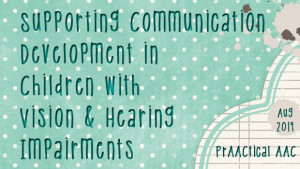
If you are new to working with young children who have both hearing and vision loss, this resource is for you. It is challenging it to complete meaningful assessments and to use those data to design effective interventions. This resource guide, edited by Dr. Charity Rowland, has wonderfully prAACtical information. In addition to the general content, there is specific information for SLPs, special educators, psychologists, and families. https://www.livebinders.com/media/get/NTEzMDI3OA==
Filed under: PrAACtical Thinking
Tagged With: beginning communicator, Charity Rowland, deafblind, hearing impairment, vision impairment
May 29, 2014
by Carole Zangari -
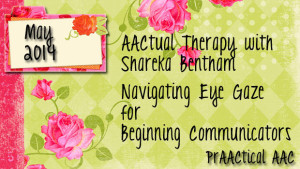
Today, we welcome back Shareka Bentham, who has told us about her AAC adventures with the Harlem Shake, a field trip, and more. In this post, she shares her experiences in getting little ones started on the intentional use of eye gaze for communication. ::::::::::::::::::::::::::::::::::::::::::::::::::::::::: I think that most Speech & Language Therapists have those moments in therapy where they’re wondering “Am I doing the right thing here??” I have been feeling that way recently in my practice as I have been nudged into the world of using the head and eyes for communication. I was (with extensive research) once able to use an eye gaze board quite successfully with an adult patient in the final stages of ALS, but I had never used such techniques in my paediatric clinic. However, I now have a few little ones on my caseload who have severe physical limitations, and are unable to... [Read More...]
Filed under: PrAACtical Thinking
Tagged With: beginning communicator, eye gaze, Shareka Bentham
December 30, 2013
by Carole Zangari -
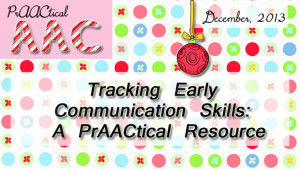
This month, we’ve been talking about ways to support beginning communicators, particularly those at the pre-intentional stage. In this brief post, we share a resource that you can use for graphing data. You can download the packet here or go to the e-Toolbox and look in the Downloads area. Direct Link to File – https://praacticalaac.org/?wpfb_dl=95
Filed under: PrAACtical Thinking
Tagged With: assessment, beginning communicator, download, preintentional communication
December 28, 2013
by Carole Zangari -
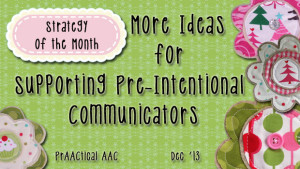
This month, we’ve been talking about how to support individuals who are at the earliest levels of communication: the perlocutionary or pre-intentional stage. Although everyone goes through a stage at which behavior is considered communicative only because the partner perceives it that way, some individuals linger there for months or years. What steps can SLPs take in order to help these children and adults have meaningful interactions and build more effective communication skills? Here are some prAACtical thoughts on the matter. Prepare for Skepticism Some people in the client’s life may not believe that there is real potential for communication growth. This is particularly true for learners who are a bit older. When children reach the late elementary school and are still at the pre-intentional stage, there is a tendency to fear that ‘real’ communication is beyond the learner’s grasp. In our view, that is rarely the case. VERY rarely.... [Read More...]
Filed under: Strategy of the Month
Tagged With: beginning communicator, cause-effect, consistency, preintentional communication, touch cue
December 21, 2013
by Carole Zangari -
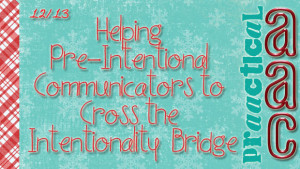
Earlier this month, we talked about the communication journey, from communication that is completely partner-inferred (pre-intentional) to communicating purposefully. The fastest route that we know of for helping clients become more purposeful communicators is a 3-step process. Select a Signal Believe it or not, we can get real intentional communication going with just a single motor act that will function as a signal. The Signal should be something the learner already does, such as moving an arm, tapping the tabletop, vocalizing in a certain way, or rocking. The Signal can also be the absence of movement. One beautiful little girl comes to mind as an example. She paced constantly, enough to wear down a track in the family room carpet – a neat little triangle from the TV to the sofa to her grandma’s recliner. When she wanted something she’d just stop pacing. (Sounds pretty straightforward but it took us... [Read More...]
Filed under: Strategy of the Month
Tagged With: beginning communicator, communication opportunity, pre-intentional
December 10, 2013
by Carole Zangari -
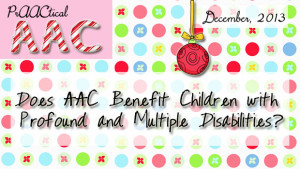
For most SLPs, it is easy to see how AAC can be beneficial to someone with motor difficulties, like cerebral palsy or ALS. To say that AAC strategies and technologies can be life-changing for these individuals is not an understatement. Similarly, the fields of SLP and special education now recognize that visual supports and AAC options are a standard of care for people affected by autism who have little or no functional speech. Not only does AAC provide a means for functional communication, but it also plays facilitative important role in speech and language development. To be sure, there are significant challenges in the implementation of AAC supports and services with these populations, but the practices themselves are now widely recognized for their positive impact on communication, literacy skills, independence, and behavior. But what about individuals with the most significant learning challenges? In this post, we share an article looking... [Read More...]
Filed under: PrAACtical Thinking
Tagged With: beginning communicator, intellectual disability, PMLD, prelinguistic communication, research support








